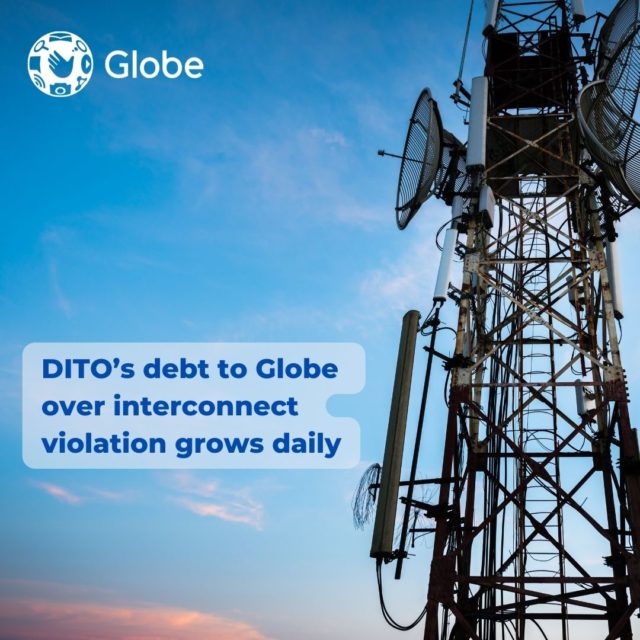Globe, the country’s leader in mobile, asserts that DITO continues to violate its interconnect agreement due to the latter’s refusal to pay the P622 million it owes Globe over fraudulent calls through its network. More notably, DITO did not deny the debt it owes Globe in its press statement issued on August 9.
DITO’s debt increases about P2.5 million every day, with an average of 1,000 fraudulent calls detected daily. DITO has persistently ignored calls for payment even though compensation is clearly stated in its interconnect agreement with Globe.
This matter is the subject of Globe’s request for the National Telecommunications Commission (NTC) to temporarily disconnect the interconnection trunk lines between Globe and DITO over persistent fraudulent calls that pass through DITO’s network into Globe.
Globe initiated the request in July 22, 2022 through a pleading before the NTC, seeking to prevent DITO’s further breach of its interconnect agreement, as ISR (international simple resale) or bypass traffic– international calls masked as local calls– continue to pass through DITO’s network into Globe lines.
Globe Group General Counsel Froilan Castelo says, “These illegal calls clog the network to the detriment of our customers. We need to take utmost caution as ISR calls also carry the risk of exposing our customers to vishing or voice call scams.”
Castelo adds, “This is a clear violation of Article 10.1 of our interconnection agreement with DITO, which defines bypass as ‘activity, whether undertaken unilaterally by a Party, or jointly by a Party and its subscriber, or a third Party, that deprives a Party its due compensation for traffic terminated or routed to its network.’”
Under the interconnect agreement, DITO is accountable for bypass traffic committed by a third party using its network. Globe, being the aggrieved party, is entitled to bypass compensation as stipulated in the agreement.
DITO has refused to compensate Globe for interconnect violations, and its debt to Globe has continued to increase even as it petitioned the NTC for additional interconnection capacity despite continued breach of our agreement.
“Contrary to DITO’s claim that we are citing its debt as a “ruse” to hamper interconnectivity, we assert that its continued violations of our interconnect agreement cannot and shall not be left unchecked as it congests the network, affecting our customers. Their ongoing violation and unpaid debt are a fact, not a ruse,” asserts Castelo.
To be clear, Globe had exhausted all options to collect penalties from DITO before escalating the matter to the NTC last November 2021. We were constrained to do so as DITO, in ignoring requests to pay its debt arising from our interconnection contract, persistently refuses to honor the terms of our agreement.
We reiterate a provision under Article 10 of our interconnect agreement which states the following.
“In the event a Party repeatedly violates Article 10 hereof, the aggrieved Party may, in addition to its right to demand compensation on account thereof, after due notice and efforts to reach settlement shall have been exhausted, terminate this Agreement, disconnect and/or deactivate any of the interconnecting trunks or Interconnection Facilities for the purpose of severing the interconnection after securing NTC approval. In which case, the aggrieved Party shall not be liable to the offending Party for any liability, loss or damage whatsoever arising out of such termination, disconnection, and/or deactivation. The offending Party shall assume liability for damages to its subscriber and/or any third party as a result of such termination, disconnection, and/or deactivation.”
This provision clearly gives Globe the right to seek payment from DITO and ask the NTC to temporarily terminate the interconnect.
On the allegation that these illegal calls also emanate from Globe to DITO, Castelo clarified that, “Those reported to us were found to be not fraudulent and non-ISR.”
Globe has been compliant with its interconnect deals with DITO, such as the domestic voice and SMS interconnect in November 2020, landline in March 2021, and the Cellular Mobile Telephone Systems International Gateway Facility (CMTS – IGF) in September 2021, which allow local voice and text traffic interconnectivity, as well as international mobile calls through DITO’s and Globe’s international partners or via roaming service.
“The interconnection is existing and it is working,” confirms Castelo.
The parties completed local interconnection for Globe-DITO mobile voice and SMS in April 2021 and the Innove/Bayan-DITO local landline and mobile interconnection in May 2022, while the Innove/Bayan–DITO IGF (international) interconnection is in the works.
We entered into these interconnectivity agreements in good faith, in the hope of encouraging healthy competition and providing good service and experience to customers using both our networks. This is also compliant with the NTC’s directive mandating compulsory interconnection among all providers.
“Our move to protect our network and customers from fraudulent calls and seek DITO’s accountability is part of our commitment to integrity and fair business practice, with the view of providing consistently reliable service to our customers,” Castelo affirms.
To learn more about Globe, visit www.globe.com.ph.





